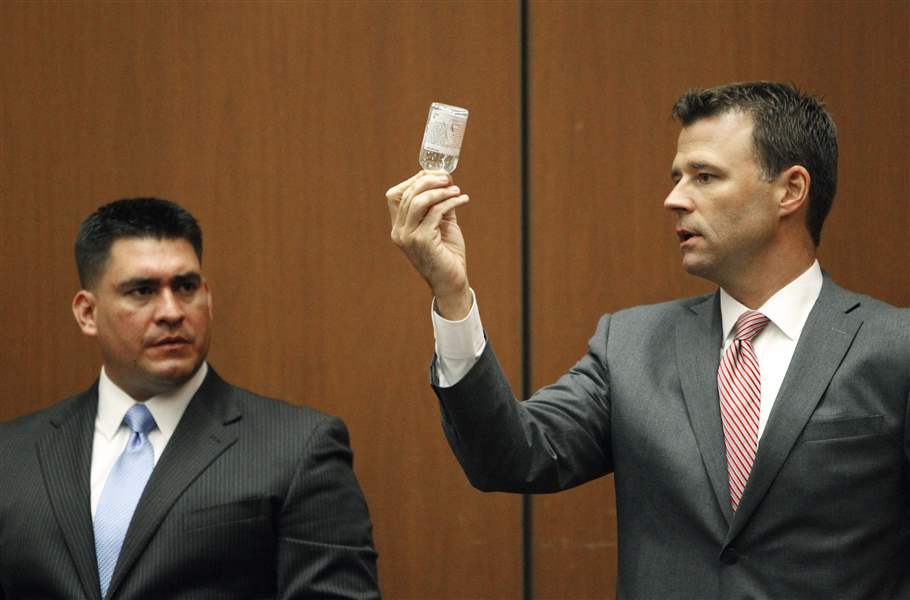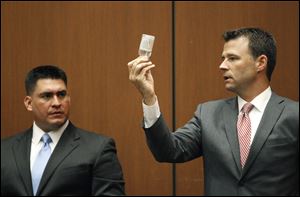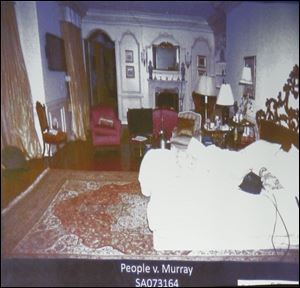
Doctor took medical vials from Jackson’s nightstand before 911 called, bodyguard testifies
9/29/2011
Deputy District. Attorney. David Walgren, holding a bottle of propofol, questions Alberto Alvarez, one of Michael Jackson's security guards, during Conrad Murray's involuntary manslaughter trial in downtown Los Angeles, Thursday. Murray has pleaded not guilty and faces four years in prison and the loss of his medical license if convicted of involuntary manslaughter in Michael Jackson's death.
Associated Press

Deputy District. Attorney. David Walgren, holding a bottle of propofol, questions Alberto Alvarez, one of Michael Jackson's security guards, during Conrad Murray's involuntary manslaughter trial in downtown Los Angeles, Thursday. Murray has pleaded not guilty and faces four years in prison and the loss of his medical license if convicted of involuntary manslaughter in Michael Jackson's death.

Deputy District. Attorney. David Walgren displys an image of Micheal Jackson's Holmby Hills bedroom while questioning Alberto Alvarez,one of Michael Jackson's security guards, during Conrad Murray's involuntary manslaughter trial in downtown Los Angeles, Thursday. Murray has pleaded not guilty and faces four years in prison and the loss of his medical license if convicted of involuntary manslaughter in Michael Jackson's death.
LOS ANGELES — The first bodyguard to reach Michael Jackson’s bedroom after the singer’s doctor called for help testified Thursday that he was told by the physician to gather medicine vials before calling 911.
Alberto Alvarez said Dr. Conrad Murray grabbed the vials from a nightstand next to Jackson, who was still in his bed.
“He said ‘Here, put these in a bag.’” Alvarez said of Murray. Alvarez said at first he thought he was bagging the items in preparation for a trip to the hospital. He said he trusted Murray because he was a doctor.
“In my personal experience, I believed Dr. Murray had the best intentions for Mr. Jackson,” Alvarez said. “I didn’t question his authority.”
Deputy District Attorney David Walgren showed Alvarez and jurors a vial of propofol while the bodyguard was on the stand at the third day of Murray’s involuntary manslaughter trial. Murray has pleaded not guilty.
Jurors intently looked at the bottle, which appeared to still contain some liquid.
Prosecutors are calling key witnesses in an attempt to show Murray delayed calling authorities on the day the King of Pop was found lifeless and was intent on concealing indications that he had been giving the singer doses of the surgical anesthetic.
At times during Alvarez’s testimony, he looked directly at Murray, who occasionally passed notes to his attorney.
When he entered the bedroom, Alvarez said, he saw Jackson’s eyes were open and was surprised to see the singer was wearing a condom catheter, a medical device that allows one to urinate without having to get up.
Alvarez testified that Murray only told him Jackson had a bad reaction.
Walgren played Alvarez’s 911 call for jurors. “He’s pumping the chest, but he’s not responding to anything, sir,” Alvarez told the dispatcher, urging them to send an ambulance quickly.
The burly Alvarez became emotional as the 911 call was played for jurors. Jackson’s mother, Katherine, appeared distraught and her son, Randy, huddled next to her and put his arm around her.
“Was that difficult to hear?” Walgren asked.
“It is,” Alvarez replied.
Alvarez said, after hanging up with dispatchers, he performed chest compressions on Jackson while Murray gave the singer mouth-to-mouth resuscitation efforts. The doctor remarked it was his first time performing the procedure.
“’I have to,’” Alvarez recalled Murray telling him, “’because he’s my friend.’”
Alvarez recalled seeing Murray at the hospital where Jackson was taken and sitting next to the emergency room.
“’I wanted him to make it,’” Alvarez quoted Murray as saying. “’I wanted him to make it.’”
Alvarez said he’s been approached numerous times by media outlets that have offered him hundreds of thousands of dollars to tell his story. He’s refused every time, even though he’s struggled financially since Jackson’s death.
“I don’t have steady work,” he said. “I went from a great salary to hardly anything.”
Prosecutors have been calling witnesses who were with Jackson and Murray the day the singer died.
Authorities accuse Murray of giving Jackson a lethal dose of the anesthetic propofol in the bedroom.
The jury has already gotten a glimpse into the entertainer’s inner sanctum through photos and testimony.
Alvarez’s account of what occurred on the day of Jackson’s death was challenged by Murray’s defense attorneys.
Ed Chernoff began to attack Alvarez’s recollection of when Murray asked the bodyguard to gather the medicine vials. Chernoff suggested Alvarez may have placed the vials in the bag after paramedics arrived. Alvarez maintained Murray gave his instructions prior to the 911 call.
Chernoff questioned Alvarez’s timeline, noting that the bodyguard had spoken to Jackson’s personal assistant on a cell phone two minutes before he called 911. The call, according to records, lasted 88 seconds. Chernoff then began to tick off the number of things Alvarez said he did, including ushering two of Jackson’s kids out of the bedroom, before Murray asked the bodyguard to grab the vials.
On Wednesday, Chernoff asked Faheem Muhammad, Jackson’s head of security, and Michael Amir Williams about whether they conferred with Alvarez before their interviews with detectives.
Williams, who was Jackson’s personal assistant, said his interview with detectives had been delayed. He testified that he received an urgent phone call from Murray on the day of Jackson’s death but wasn’t told to call 911.
He called Muhammad, who then dispatched Alvarez to Jackson’s bedroom on the second floor of the singer’s rented mansion in the ritzy Holmby Hills neighborhood of Los Angeles.
The room was off-limits to Jackson’s staff, and Muhammad paused before racing up the stairs after reaching the mansion just before paramedics arrived.
He described a heart-wrenching scene. By then, he said, Jackson had been removed from his bed and was on the floor, where Murray, sweaty and frantic, was performing CPR.
Alvarez was pacing nervously, Muhammad told the jury. When he saw Jackson up close, he understood why.
“What did you observe about his face,” Walgren asked
“That his eyes were open,” Muhammad said. “That his mouth was slightly open.”
“Did he appear to be dead,” Walgren asked.
“Yes.”
Also expected to testify on Thursday are Kai Chase, a chef who spoke to Murray briefly on the morning of Jackson’s death, and paramedics who also tried to revive the singer. The medics believed Jackson was already dead by the time they arrived, but Murray insisted the performer be taken to a hospital for additional resuscitation efforts.
Prosecutors contend Murray did not tell any of the bodyguards or emergency personnel that he had been giving Jackson propofol and other sedatives to help him sleep.
Chernoff claimed in opening statements that Jackson gave himself the lethal dose.
Much of the trial in later sessions will focus on the science of what killed Jackson, and dueling theories of Murray’s role.